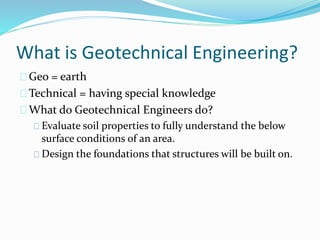All About Geotheta
Table of ContentsThe Buzz on GeothetaRumored Buzz on GeothetaThe Basic Principles Of Geotheta Geotheta Fundamentals ExplainedSee This Report on Geotheta

They perform website examinations, gather samples, do research laboratory examinations, and analyze data to review the suitability of the ground for construction projects - Geo Tech Engineer. Based on their searchings for, geotechnical designers offer referrals for foundation style, slope security, retaining frameworks, and reduction of geotechnical threats. They collaborate with various other specialists, such as designers, architectural designers, and construction groups, to make sure that geotechnical considerations are incorporated right into the overall task style and execution
By analyzing the actions and properties of dirt and rock, they can identify potential geotechnical hazards such as landslides, dirt negotiation, or slope instability. Their knowledge helps protect against failures or crashes that might jeopardize lives and residential or commercial property. Here are some detailed obligations and duties of a geotechnical designer: Site Examination: Geotechnical engineers conduct website investigations to collect information on subsurface problems.
They translate the data to understand the homes and habits of the dirt and rock, including their stamina, permeability, compaction characteristics, and groundwater conditions. Geotechnical Evaluation and Design: Geotechnical designers evaluate the data accumulated throughout site examinations to analyze the stability and suitability of the site for construction tasks. They do geotechnical calculations and modeling to review factors such as bearing ability, settlement, incline stability, lateral earth pressures, and groundwater flow.
The Basic Principles Of Geotheta
Structure Style: Geotechnical engineers play a critical role in making foundations that can securely support the intended structure. They assess the soil problems and lots needs to determine the suitable structure type, such as shallow structures (e.g., footings), deep structures (e.g (https://www.awwwards.com/geotheta/)., stacks), or specialized methods like soil improvement. They take into consideration factors such as negotiation limitations, bearing capacity, and soil-structure interaction to develop optimal foundation styles
They examine construction plans, monitor site tasks, and conduct area evaluations to confirm that the style recommendations are followed. If unpredicted geotechnical problems arise, they evaluate the circumstance and give suggestions for removal or adjustments to the layout. Risk Assessment and Reduction: Geotechnical engineers examine geotechnical threats and dangers related to the project website, such as landslides, liquefaction, or soil disintegration.

Collaboration and Interaction: Geotechnical designers function very closely with other professionals involved in a project, such as designers, architectural designers, and building and construction teams. Reliable communication and cooperation are crucial to integrate geotechnical factors to consider into the general job style and construction process. Geotechnical designers give technical knowledge, solution questions, and guarantee that geotechnical demands are satisfied.
Some Known Details About Geotheta
Here are some kinds of geotechnical engineers: Foundation Engineer: Structure designers focus on creating and examining structures for frameworks. They assess the dirt conditions, lots needs, and site qualities to determine one of the most suitable structure type and style, such as superficial foundations, deep foundations, or specialized methods like heap foundations.
They review the elements affecting incline security, such as dirt residential properties, groundwater problems, and incline geometry, and establish strategies to stop incline failures and alleviate threats. Quake Engineer: Quake designers specialize in evaluating and designing structures to endure seismic pressures. They examine the seismic threat of a website, evaluate soil liquefaction capacity, and develop seismic layout criteria to make sure the safety and strength of frameworks throughout earthquakes.
They execute field testing, collect examples, and examine the gathered information to identify the dirt properties, geologic formations, and groundwater problems at a website. Geotechnical Instrumentation Engineer: Geotechnical instrumentation engineers concentrate on monitoring and determining the behavior of soil, rock, and frameworks. They install and maintain instrumentation systems that check variables such as soil negotiation, groundwater levels, slope motions, and structural displacements to analyze efficiency and supply early warnings of possible concerns.
A Biased View of Geotheta
They conduct examinations such as triaxial examinations, combination tests, straight shear examinations, and leaks in the structure tests to my review here collect information for geotechnical evaluation and design. Geosynthetics Designer: Geosynthetics designers focus on the design and application of geosynthetic materials, such as geotextiles, geogrids, and geomembranes. They utilize these materials to enhance dirt security, enhance slopes, offer water drainage options, and control disintegration.
They often tend to be investigatory individuals, which suggests they're intellectual, reflective, and analytical. They are interested, systematic, reasonable, analytical, and logical. Some of them are additionally social, suggesting they're kind, generous, cooperative, client, caring, practical, empathetic, skillful, and pleasant - Geotechnical Engineers.
In the workplace environment, geotechnical engineers use specialized software application devices to perform computations, create layouts, and evaluate information. They prepare records, evaluation project specifications, communicate with clients and staff member, and coordinate task activities. The workplace setting gives a favorable atmosphere for research, evaluation, and collaboration with various other professionals associated with the task.
5 Easy Facts About Geotheta Explained
They often visit job sites to perform website examinations, analyze geotechnical conditions, and gather data for analysis. These brows through entail traveling to various places, occasionally in remote or difficult terrains. Geotechnical engineers may do dirt sampling, conduct examinations, and screen construction activities to ensure that the geotechnical facets of the task are being implemented appropriately.
Geotechnical designers likewise work in specialized geotechnical labs. In these centers, they conduct experiments, perform examinations on dirt and rock examples, and analyze the design properties of the products. Geotechnical lab engineers work extensively in these environments, taking care of screening tools, operating instruments, and recording information. They collaborate with other research laboratory team to guarantee exact and dependable screening outcomes.